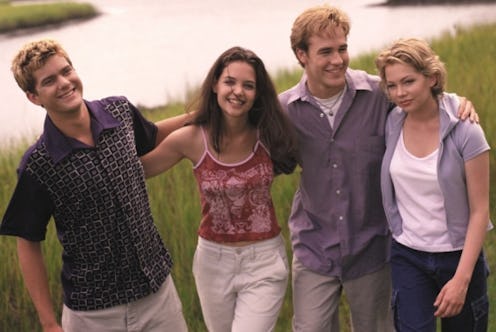
There are a few major questions every teen faced in their lives back in the late '90s/early '00s: Coke or Pepsi? Backstreet Boys or *N Sync? Pacey or Dawson? When it came to the latter, no flip-flopping was allowed; lines had to be drawn, and you had to pick a side. Only one side was victorious in the end, and that was Pacey — but, what we didn't know at the time was that things could have been vastly different. During the Dawson's Creek Writers Room reunion panel at the 4th annual ATX Festival June 6, series creator Kevin Williamson revealed that Joey's final decision of Pacey was actually his last-minute change of heart. Up until Williamson had written half of the two-hour series finale, he was sure that Ms. Potter would pick her first love, Dawson Leery.
That's right: Joey almost ended up with Dawson. I'll let you take a minute to soak that in.
"My mother went to my grave hating me for that choice," the showrunner joked, and half the Dawson's fandom may have felt the same. (I'm Team Pacey 100%, for the record.) But Williamson ended the teen drama like he did because he felt that the show had "evolved" from where it began. "And I also wanted to say something about soulmates," he continued. "It's not always romantic love." Joey/Pacey/Dawson were a soulmate triangle, all bound to each other in different but significant ways.
As for Jen's death, Williamson saw it as a natural progression. "Dealing with death is one more way of coming of age. When you realize life is so precious, it forces you to make decisions." Like the one between the two great loves of your life. God, I miss this show.
Besides the resolution of the show's central love triangle, the panel — including writers Jenny Bicks (Men In Trees), Gina Fattore (Californication), Anna Fricke (Being Human), and Rob Thomas (everything else), producer Paul Stupin (Switched At Birth), and moderator Julie Plec (Vampire Diaries) — took us back to Capeside with some delicious nuggets of '90s nostalgia. Here's what I learned from attending the event:
- Joey was given a traditionally male name on purpose by Williamson, as a nod to his sexuality. He also said that he always planned for Jack (Kerr Smith) to come out, but he kept it from his writers until the audience fell in love with the character. Jack's coming out experience was based on the real story of staff writer (and Flash and Arrow showrunner) Greg Berlanti — right down to the mysterious romantic poem that falls into the wrong hands.
- Bicks gave a shout out to the bad girl of the Creek: "Jen was the dark side of it all, which makes her really fun to write."
- Everyone wanted to know what the deal was with Pacey becoming a stockbroker, even Williamson: "I was long gone by then — how did that happen?" Fricke tried to explain it: "We were really into that movie Boiler Room."
- Andie's mental illness developed because the writers adored Meredith Monroe and wanted to keep her around for longer than a "temporary love interest" arc would usually allow. They took the portrayal of her struggles seriously, and "course-corrected" when a fan informed them that they had made a factual error in showing her treatment.
- The panel talked about getting Dawson and Joey's first kiss out of the way in the Season 1 finale. Thomas, who went on to create fiercely loved shows like Veronica Mars, Party Down, and iZombie, noted that he learned from Dawson's "not to save stuff," and for good reason: "If you do, you might not be on the air to see it happen."
- Williamson knew that a Joey and Pacey coupling was in the cards as soon as he saw the dailies from "Double Date," the infamous biology project episode. "I don't know when this is going to happen, but it's going to happen." Yeah, it did.
- The panel acknowledged their missteps, including the introduction of Jen's even badder bad girl "sister" Eve. Williamson may have tried to deflect. "Who's Eve?"
- Williamson left the show after Season 2 to fulfill other commitments, but leaving something so autobiographical was extremely painful for him. He couldn't even bring himself to watch the show for a while. When he agreed to come back and write the series finale, it was the writers who pitched the time jump. It would give Williamson the freedom to wrap up the characters' stories how he wanted, even though he hadn't been privy to every single decision.
- Fricke summed up the lasting appeal of Dawson's, by pointing out the way it captured the universal experience of adolescence and the skill it takes to do that. "To do things that simply is complicated." Truth.
Dawson's Creek wasn't only a seminal piece of teen-oriented television; it was also a training ground for the writers who would go on work on even more memorable and boundary-challenging TV. It's a a pretty auspicious legacy for the kids of Capeside.
Images: Warner Bros. Television; Giphy (3)